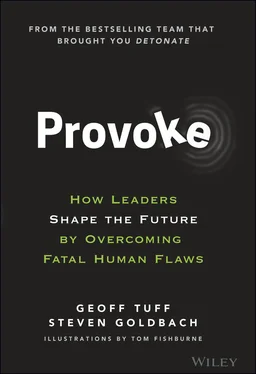Names: Tuff, Geoff, 1970- author. | Goldbach, Steve, 1973- author.
Title: Provoke : how leaders shape the future by overcoming fatal human flaws / Geoff Tuff, Steven Goldbach.
Description: Hoboken, New Jersey : Wiley, [2021] | Includes index.
Identifiers: LCCN 2021020639 (print) | LCCN 2021020640 (ebook) | ISBN 9781119764472 (cloth) | ISBN 9781119787556 (adobe pdf) | ISBN 9781119787549 (epub)
Subjects: LCSH: Leadership. Classification: LCC HD57.7 .T865 2021 (print) | LCC HD57.7 (ebook) | DDC 658.4/092—dc23
LC record available at https://lccn.loc.gov/2021020639
LC ebook record available at https://lccn.loc.gov/2021020640
Back Cover Cartoon: © Tom Fishburne
Cover design: Paul McCarthy
For our families: Martha, Michelle, our kids, our siblings, and especially our parents, who originally provoked us to look at the world inquisitively .
Kids love rollercoasters.
Not all kids, and not all rollercoasters … but by and large they just love them.
Although they exhibit patience for nothing else, they are willing to wait in a long line just to get a few minutes of thrill. They smile with glee as the car grinds and clacks up the track at a snail's pace, anticipating the hair-raising freefall that comes on the other side when all that potential energy is converted to kinetic. Many of them even put up their hands as the car moves from one phase to the next to increase the thrill level, testing the safety design of the harness that is keeping them inside. Not knowing precisely what's coming doesn't scare them. It excites them.
In adulthood, it's safe to say one's relationship with rollercoasters changes. There are some who still love them, but our (albeit unscientific) experience suggests it becomes a smaller and smaller proportion of the population as we age. For those who do not enjoy rollercoasters, the thrill is gone and the experience is quite literally the opposite of the glee of youth. Instead of eyes wide open, looking around at the world and what's to come, the eyes stay clamped shut in the hope that not seeing will make the experience less painful. Instead of testing the boundaries of the safety system by raising your arms, riders freeze in place, white-knuckling the safety bar, fingernails dug in, just praying for a return to stable ground. Instead of seeing what happens, these riders wish for a mental map of what's coming next and desperately hope that the whole thing will just end as quickly as possible.
The physical experience is the same – the feel of the car, the path of the track, and the centripetal force bolstered by redundant safety mechanisms. But the emotional reaction to the experience is fundamentally different.
The history of leadership is chock-full of people who look like both types of riders: those who embrace the ride and others whose fixation on each possible pitfall renders them immobile. Both groups, in past decades, have had a reliable foundation on which to “ride,” with predictable outcomes linked either to carefree confidence that everything is on a safe path or obsessive overanalysis of knowable details. But the plight of each archetype is complicated by the realities of today's environment, which are serving up increasingly unpredictable twists, crests, and dives.
Whether their bias has been to follow the momentum of past experience or to call for ever-increasing burdens of analytical proof, leaders will have a harder and harder time anticipating and capitalizing on the peaks. Yet it's at these peaks when new opportunities shift from the possibility of “if” to the inevitability of “when.” Past data and experience are proving less useful and, to make matters worse, most leaders (whether they know it or not) are forced to act with blinders on. Basic human cognitive biases – what we call “fatal flaws” – narrow individual and organizational peripheral vision and lead to all-too-typical dysfunction.
The best leaders rise above these constraints to gain perspective; they set aside their terror of the ride and summon their inner child, who can better deal with the twists and turns. They recognize – and even appreciate – that while they may not be able to control all the outcomes, they can plan for and control their reactions.
These days, the conviction to act – especially in the absence of perfect data – is the only way to provoke the future you desire. Action creates potential energy. Action allows you to position yourself to see the peak sooner and more clearly than others. Action gives you the power to move through the phase change of “if” to “when” so that you can make the most use of the kinetic energy when it's released.
And action, in an uncertain world, is increasingly the best way to learn. If you don't act with purpose, your once-thriving business could suddenly become a “wind-down” firm, operating on borrowed time.
Detonate , our previous book, was our call to selectively blow up the foundations of past success to allow for forward progress. Provoke is about looking forward and working through the natural human instincts that keep people frozen in place, thinking and analyzing. It is about forcefully gathering the will to act in the face of deepening uncertainty and DO SOMETHING!
PART I PREDICTABLE PATTERNS
CHAPTER 1 Patterns from the Past
“1.75%? Why would I care?” asked the senior executive as he flippantly tossed the PowerPoint page onto his conference table, put his foot on the table, leaned back in his chair, and, yes, stuck his hand into his pants like Al Bundy in the 1990s sitcom Married with Children .
Steve and his colleague exchanged a knowing glance. They had worked together for 15 years and by that point they basically shared a brain, which, at that point, was thinking: “Is this guy for real?”
They were in his lavish office, sitting at his conference table. Steve noticed the golf trophies, pictures with celebrities, and large and expensive desk. The office screamed, “I'm successful!”
It was 2009 and, given the difficult economic climate, Steve and his colleague were being especially aggressive in getting out to meet new executives. They had done some work for a large, diversified media and communications company, creating a segmentation of consumer behavior in its industry. Their client, pleased with the work, was looking to present it at an upcoming industry conference and wanted to get some reactions from executives at peer companies – hence the reason they were sitting in Al Bundy's office.
The work they were sharing included a detailed segmentation of the consumer landscape for communications services like Internet, phone, video/television packages, and security. They had surveyed thousands of customers about their behaviors and actions. The survey revealed the typical and expected results: when people got married or had families, their Internet and video usage dramatically changed from when they were single. Expenditure on things like pay-per-view and other channels tended to be higher among this group. With more devices in the house, they also were willing to pay for higher Internet bandwidth.
This wasn't news. Companies in this space knew and loved these customers. They paid their bills on time, they didn't move, and as a result they didn't “churn.” And, back in 2009, they probably had a landline, too. Therefore, if you successfully acquired one of these customers, you were likely to retain them, leading to a steady, predictable stream of revenue.
At the other end of the spectrum were the singles. They typically lived in an apartment and had more focused communications needs. This was a group that tended to select the most basic Internet and television packages. Sometimes this choice was driven by personal preference (think people who like to read at night). But sometimes this was driven by affordability, where having lots of channels could be expensive. You could predict the reasons for this choice based on income levels (typically tied to specific geographic locations) and whether the home was rented or owned. Some singles with higher disposable income bought a more comprehensive communications package, but it typically included just video and Internet; even in 2009, this group didn't want a landline – a mobile phone was just fine for them. These singles, perhaps because of their income or preferences, were willing to spend more on faster Internet speeds and specialty channels.
Читать дальше












